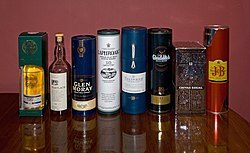Whisky
Whisky, or whiskey, is an alcoholic drink distilled from grain and aged in wooden casks.
The name comes from a gaelic word. In Ireland, it is called whiskey, with an added letter 'e'. Whiskey made in the United States often uses the Irish spelling.
There are many kinds of whisky, of which most important are:
- Single malt: All of the whisky has been made from single batch of malt in one single distillery. They have been matured in oak barrels, usually 6 to 24 years. Glenfiddich is the world's best-selling single malt whisky. It comes from Speyside in the Scottish Highlands, and accounts for 35% of world sales.[1] The Glenlivet comes second, from the same area. Thus, despite all attempts at competition, this small area near the Spey River still dominates the world market for single malt whisky.
Other well-known single malts are Laphroaig, Lagavulin, Bowmore, Ardbeg and Talisker. Most single malts come from Scotland, either Lowlands, Highlands or Scottish Isles. Nikka Yoichi comes from Japan. - Blended whisky or Scotch: A Scotch is a mixture of various single malts. This is the most common type of whisky. Famous blended whiskys are Johnnie Walker, Chivas Regal, Ballantines, J&B, The Famous Grouse and Vat-69. In the United States the word "scotch" refers to the blended whiskys of Scotland. Blenders do not distill whisky, but mix various single malts.
- Irish whiskey: These are blended whiskeys from Ireland. While Scottish whiskys are distilled twice, Irish whiskeys are distilled three times before they are matured. Famous Irish whiskeys are Jameson's and Bushmill's.
- Bourbon whiskey: Bourbon is American whiskey which contains maize. It may all be made from maize (corn whiskey) or it may also contain barley malt. Famous bourbons are Four Roses, Jim Beam and Kentucky Gentleman. The name comes from Bourbon county, Kentucky.
- Rye: As name implies, rye whiskey is made from rye malt. These are especially popular in Canada. Famous Canadian rye whiskeys are Canadian Club and Alberta Premium
Most whiskys contain around 40% alcohol.
Scotch whisky
Scotch whisky is legally defined by Scotch Whisky Order of 1990 (UK),[2] and the Scotch Whisky Act of 1988,.[3]
These say that Scotch whisky must:
- Must be distilled at a Scottish distillery from water and malted barley, to which only other whole grains may be added, have been processed at that distillery into a mash, converted to a fermentable substrate only by endogenous enzyme systems, and fermented only by the addition of yeast,
- Must be distilled to an alcoholic strength of less than 94.8% by volume so that it retains the flavour of the raw materials used in its production,
- Must be matured in Scotland in oak casks for no less than three years,
- Must not contain any added substance other than water and caramel colouring, and
- May not be bottled at less than 40% alcohol by volume.
Alcohol is a favourite way to collect tax (called excise duty) in the United Kingdom. When Gordon Brown, a Scot, became Chancellor of the Exchequer, he concentrated on taxing beers and wines, and did not increased the duty on whisky. This, he said, was to help the Scotch whisky industry to recover, increase exports and make more money.
Whisky Media
- Distillerie OldBushmills.jpg
- Erskine Nicol, A Nip against the Cold (1869).jpg
A man pours some whisky into a flask in this 1869 oil painting by Scottish artist Erskine Nicol.
- Auchentoshan03.jpg
Copper pot stills at Auchentoshan Distillery in Scotland
- WhiskyMaking Kilned BarleyMalt.jpg
Malted barley is an ingredient of some whiskies.
- DecaturBourbons.jpg
Various American whiskeys on store shelves
- CanadianWhisky.JPG
Various Canadian whiskies photo taken by en:User:Hammersbach.
- IrishWhiskey.jpg
Various Irish whiskies. Picture by Cafeirlandais.
The regions of Scotch whisky
References
- ↑ About whisky: http://www.scotchwhisky.com/english/about/malts/regduff.htm Archived 2008-05-27 at the Wayback Machine
- ↑ "The Scotch Whisky Order 1990". Office of Public Sector Information. Retrieved 2006-12-22.
- ↑ "Scotch Whisky Act 1988 (c. 22)". Office of Public Sector Information. Retrieved 2006-12-22.


